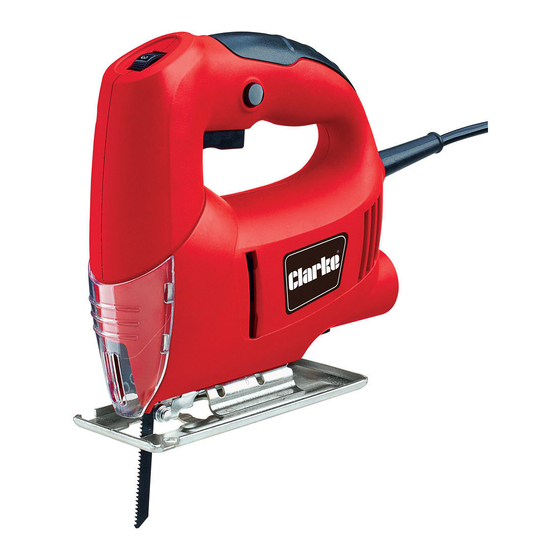
USING THE JIGSAW
1. When starting, place the sole-plate on the workpiece and let the blade
touch the cut line. To make your cut, start the jigsaw and move the saw
slowly forward along the cutting line.
2. Ensure the saw blade is not striking on anything below the workpiece and
that the power cable is well away from the moving blade before starting
the saw.
3. Adjust the speed controller to suit the material being cut using the
following suggested settings as a starting point. However, the optimum
speed will be determined with practice.
Plastic
Steel
Hardboard
Ceramic, aluminium, non-ferrous metals
Timber, plywood & chipboard
• If cutting out an aperture, it will be necessary to drill a suitably sized hole in
the workpiece for use as a starting point.
• Take extra care when cutting curves - move the blade slowly to avoid
stress on the blade, leading to blade breakages. Never use a blade type
which is unsuitable for the type of material to be cut.
• When sawing, hold the saw in front of you but do not put more pressure on
the blade than is necessary and avoid putting lateral pressure on the
blade.
• Let the blade work through the workpiece, ensuring the sole plate remains
flush with the workpiece.
CUTTING DIFFERENT MATERIALS
CUTTING WOOD
Check that any previously used timber being sawn does not contain any nails
or other metal objects which would damage the blade.
CUTTING METAL
Having chosen a suitable blade for cutting metal it is recommended to
lubricate the material and saw blade with cutting oil to prevent the jigsaw
from overheating. Support the workpiece with wooden blocks on either side.
Parts & Service: 020 8988 7400/E-mail:[email protected] or [email protected]
10
1 - 3
2 - 4
3 - 4
3 - 6
4 - 6
